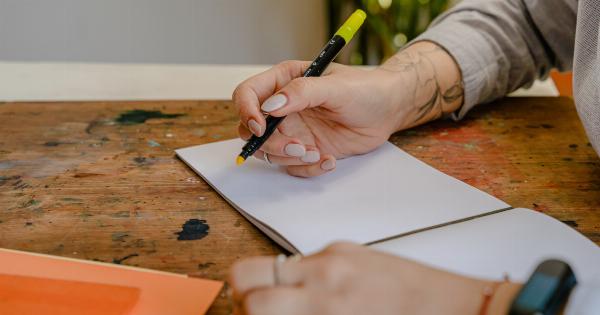Tattoos are a popular form of body art that allow individuals to express themselves, commemorate important events or people, or simply enhance their appearance.
However, for individuals with compromised immune systems, getting a tattoo can pose significant risks. Immune system disorders, such as HIV, autoimmune diseases, or undergoing immunosuppressive therapy, can weaken the body’s ability to fight off infections and heal wounds.
In this article, we will explore the riskiest tattoos for individuals with compromised immunity, and why certain precautions must be taken.
The Importance of a Sterile Environment
When it comes to getting a tattoo, the environment in which the procedure takes place plays a crucial role in minimizing the risk of infection. For those with compromised immunity, it becomes even more critical.
Tattoo studios must follow strict sterilization protocols to ensure that equipment, needles, and surfaces are free from bacteria and other pathogens. Additionally, tattoo artists should always wear disposable gloves, use sterile needles for each client, and follow proper hygiene practices to reduce the risk of introducing infections.
Avoiding Certain Tattoo Styles
While the risk of infection is a primary concern, individuals with compromised immunity should also steer clear of certain tattoo styles that may have additional risks.
For instance, tattoos that involve extensive shading, intricate details, or large areas of color may require longer sessions. Prolonged tattooing sessions can put extra stress on the body and increase the chances of complications and infections.
Choosing simpler designs or smaller tattoos can minimize the time spent under the needle, reducing the risk of potential complications for those with compromised immunity.
Choosing the Right Tattoo Artist
Ensuring that your tattoo artist is experienced, reputable, and skilled in sterilization techniques is crucial for anyone, but especially for those with compromised immunity.
Before choosing a tattoo artist, do thorough research by checking their portfolio, reading reviews, and asking for recommendations. It is also essential to have a conversation with the artist to discuss your health condition and any special requirements or concerns you may have.
A professional and understanding tattoo artist will work with you to create a safe and comfortable experience.
Preventing Allergic Reactions
Individuals with compromised immunity may also have a higher risk of developing allergic reactions to tattoo pigments. Certain colors or additives used in tattoos can trigger allergic responses in susceptible individuals.
It is essential to discuss potential allergies with your tattoo artist before getting inked. They can provide information on the ingredients in the pigments they use, allowing you to avoid any substances that may pose a risk to your health.
Additionally, it might be wise to ask for a small patch test on a small area of skin before getting a full tattoo to check for any adverse reactions.
Delayed Healing Process
Typically, getting a tattoo results in a healing process that involves scabbing, peeling, and redness. However, for individuals with compromised immunity, the healing process might be significantly delayed or complicated.
With a weakened immune system, the body’s ability to regenerate cells and fight off infections is impaired. This can lead to prolonged healing times, increased risk of infections, and potential complications. Understanding that the healing process may take longer is crucial to avoid unnecessary stress or anxiety during the recovery period.
Post-Tattoo Care
Caring for a fresh tattoo is important for everyone, but individuals with weakened immune systems should be especially diligent.
Following the aftercare instructions provided by the tattoo artist is crucial to promote proper healing and minimize the risk of infections. Avoid submerging the tattoo in water, exposing it to excessive sunlight, or using irritating substances on the tattooed area.
Keeping the tattoo clean and applying a recommended aftercare product as directed will assist in ensuring the best possible outcome for both appearance and health.
Consulting with Your Healthcare Provider
Prior to getting a tattoo, it is essential to consult with your healthcare provider, especially if you have a compromised immune system.
They can evaluate your health condition, provide specific guidance, and offer recommendations tailored to your unique situation. Your healthcare provider may advise you to take certain precautions, such as receiving vaccinations or completing a course of antibiotics before getting inked.
Their professional opinion and advice should be an indispensable part of your decision-making process.
Alternative Options for Self-Expression
For individuals with compromised immunity, getting a tattoo may pose too many risks or complications. Fortunately, there are alternative options for self-expression that can be explored.
Temporary tattoos, body makeup, or henna designs provide a temporary way to showcase creativity and personal style without the long-term commitment and potential health risks associated with permanent tattoos. Exploring these safer alternatives can still allow individuals to express themselves while minimizing any potential harm or complications.
The Impact of Tattoos on Medical Diagnoses
It is essential to consider that tattoos, especially those with medical or health-related information, might complicate certain medical diagnoses for individuals with compromised immunity.
Tattoos located near lymph nodes, in places commonly used for medical procedures, or containing necessary identification or allergy information may interfere with medical imaging or cause confusion for healthcare professionals. It is crucial to communicate any relevant tattoo information with your healthcare provider to ensure accurate diagnosis and appropriate medical care.
Conclusion
While tattoos can be a meaningful and beautiful form of self-expression, individuals with compromised immunity must consider additional risks and take specific precautions.
Ensuring a sterile environment, choosing the right tattoo artist, avoiding certain styles, and discussing potential allergies are all crucial steps to minimize any potential complications. It is vital to prioritize your health and well-being above all else when deciding to get a tattoo, exploring alternative options if necessary. Always consult with your healthcare provider to receive guidance tailored to your specific health condition.






























